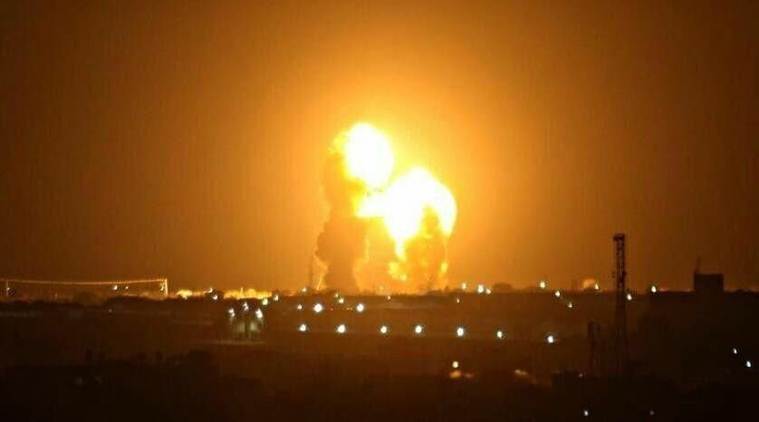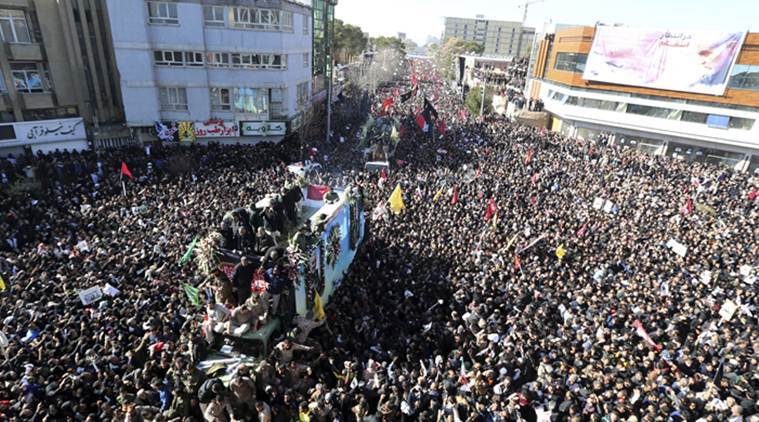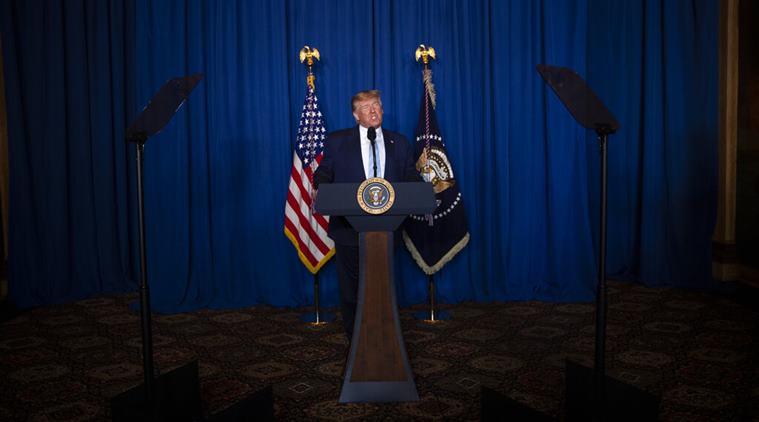The White House said in a statement that it was “aware” of attacks on US facilities in Iraq. “The President has been briefed and is monitoring the situation closely and consulting with his national security team,” the statement said.
A banner bearing the likeness of Maj. Gen. Qassem Suleimani is carried during a funeral procession in Tehran on Monday, Jan. 6, 2019. (The New York Times: Arash Khamooshi)
Written by Alissa J. Rubin, Farnaz Fassihi, Eric Schmitt and Vivian Yee
Iran attacked two American bases in Iraq with a barrage of missiles early Wednesday, Iranian official news media and US officials said, the start of what Tehran had promised would be retaliation for the killing of a top Iranian commander. “The fierce revenge by the Revolutionary Guards has begun,” Iran’s Islamic Revolutionary Guard Corps said in a statement on a Telegram channel.
Iranian news media reported the attack hours after the remains of the commander, Gen. Qassem Soleimani, were returned to his hometown in Iran for burial.
Hossein Soleimani, the editor-in-chief of Mashregh, the main Revolutionary Guards news website, said that short-range ballistic missiles had been fired at the US base at Asad, in Anbar province, in western Iraq.
One US official said six rockets had landed at Al Asad Air Base, but could not confirm that they were missiles.
Iraq’s Joint Military Command said seven rockets had hit the base. Iranian officials said the attack began at 1.20 am local time, the time that Soleimani was killed by an American drone at the Baghdad airport Friday.
The White House said in a statement that it was “aware” of attacks on US facilities in Iraq. “The President has been briefed and is monitoring the situation closely and consulting with his national security team,” the statement said.
President Donald Trump visited US military forces at Al Asad in December 2018, making his first trip to troops stationed in a combat zone.
The following statement is attributed to @ChiefPentSpox: At approximately 1730 EST on Jan. 7, Iran launched at least a dozen ballistic missiles against U.S. military & coalition forces in Iraq.
4,479 people are talking about this
The strike at Al Asad came less than two hours after reports circulated that rockets had been fired on Taji Air Base, an Iraqi military base where US troops are deployed. Officials said the reports of an attack there appeared to be false.
‘He was clearly on the battlefield.’
Defense Secretary Mark T. Esper said Tuesday that Gen. Qassem Soleimani had planned attacks to occur within days, laying out the administration’s legal justification for killing the Iranian commander in a drone strike.
US officials have been pressed over their claims that they targeted Soleimani to forestall imminent attacks against US interests.
At a Pentagon news conference Tuesday, Esper was asked whether attacks had been expected in days or weeks. “I think it’s more fair to say days,” the defense secretary said.
He declined to offer more details, nor to describe the intelligence underpinning that assessment.
Esper said Soleimani, who was killed Friday in Iraq, “was in Baghdad to coordinate additional attacks.”
“He’s been conducting terrorist activities against us and our coalition partners for over 20 years,” Esper said. “He has the blood of hundreds of Americans, soldiers, on his hands and wounded thousands more. And then we could talk about all of the mayhem he’s caused against the Syrian people, the people of Lebanon. Even his own people in Iran.”
He added: “To somehow suggest that he wasn’t a legitimate target, I think, is fanciful. He was clearly on the battlefield.”
All is well! Missiles launched from Iran at two military bases located in Iraq. Assessment of casualties & damages taking place now. So far, so good! We have the most powerful and well equipped military anywhere in the world, by far! I will be making a statement tomorrow morning.
179K people are talking about this
Esper also said that despite an unsigned draft letter from the US military command in Baghdad on troop withdrawal and a unanimous vote by the Iraqi parliament, the United States does not plan to pull its troops out of Iraq right now.
The Pentagon has made preparations in anticipation of Iranian retaliation, Esper said, and US troops in the Middle East are on a heightened state of alert.
“I think we should expect that they will retaliate in some way, shape or form,” Esper said. “We’re prepared for any contingency and then we’ll respond appropriately to whatever they do.”
President Trump walked back his threat to strike Iranian cultural targets
President Donald Trump on Tuesday told reporters he would avoid targeting cultural sites in military attacks, walking back a threat he made against Iran days earlier.
Following a bipartisan and international uproar, Trump conceded that striking such sites would amount to a war crime. “If that’s what the law is, I like to obey the law,” he said in the Oval Office as he hosted the visiting prime minister of Greece, Kyriakos Mitsotakis.
His remarks to reporters came a day after Esper said striking Iranian cultural sites with no military value would be a war crime. That appeared to put him at odds with his boss.
“We will follow the laws of armed conflict,” the defense secretary said at a news briefing at the Pentagon on Monday when asked if cultural sites would be targeted.
On Saturday, Trump declared that the United States had identified 52 potential targets in Iran, some “important to Iran & the Iranian culture.”
None of them qualified as cultural sites, according to an administration official who asked not to be identified.
But the president’s threats and his initial refusal to back down in the face of criticism generated condemnation at home and abroad while deeply discomfiting US military leaders.
Some NATO troops are leaving Iraq
NATO is removing some of the trainers who have been working with Iraqi soldiers battling the Islamic State, in the wake of the US killing of Soleimani.
On Monday, the NATO secretary-general, Jens Stoltenberg, announced that training had been temporarily suspended.
Describing security of NATO personnel, the organization said in a statement that it would be taking precautions — including “the temporary repositioning of some personnel to different locations both inside and outside Iraq.”
NATO “maintains a presence in Iraq” and remains committed “to fighting international terrorism,” an official said, but refused to provide “operational details” about troop movements.
NATO has had roughly 500 soldiers doing the training.
Some NATO countries, like Canada, Germany and Croatia, have announced that they are moving troops out of Iraq altogether, at least temporarily, because of security concerns.
Canada is temporarily moving to Kuwait some of its 500 military personnel based in Iraq, the country’s top military official, Gen. Jonathan Vance, said in a letter posted on Twitter on Tuesday.
Thirty of the 120 German soldiers in Iraq will be sent to Jordan and Kuwait, while others will remain positioned in the less volatile Kurdistan region, the German defense and foreign ministries said in a joint letter to the German parliament, the Bundestag.
“When the training is able to resume, the military personnel can be reinstated,” the letter said.
Croatia has also moved its small contingent of soldiers — 14 — from Iraq, with seven bound for Kuwait and the rest headed home, the Croatian Defense Ministry said. Slovakia has also removed its seven soldiers.
Some NATO troops began leaving Baghdad’s Green Zone in helicopters Monday night. The NATO training mission began in 2018 at Iraq’s request.
Iran issued new threats before the funeral procession
Iranian state-run news outlets reported a deadly stampede during the funeral procession for Soleimani in his hometown, Kerman, in southeastern Iran, on Tuesday.
Millions were reported to have flooded the town’s streets to witness the procession for the general, who was killed in an American drone strike in Baghdad last week.
In a fiery speech made in Soleimani’s hometown, the leader of Iran’s Islamic Revolutionary Guards Corps vowed to “set ablaze” places where Americans and their allies live.
“We will take revenge — a revenge that will be tough, strong, decisive and finishing and will make them regret,” the corps’ leader, Hossein Salami, said Tuesday in front of a crowd of mourners. “We will set ablaze the place they like, and they know where it is.”
“Today, the seeds of hatred for the US have been sown in the hearts of Muslims,” he added, according to Fars, an Iranian news agency associated with the Revolutionary Guards.
The pledge to seek vengeance echoed the rhetoric of many of the country’s leaders since Soleimani’s killing Friday. “Death to Israel,” the crowd chanted back, according to news reports. Israel, a close ally of the United States, has long been an enemy of Iran.
Thousands of mourners, dressed in black and carrying photos of Soleimani, crowded the central square of Kerman, where the general’s body was taken for burial after a funeral procession Monday in Tehran, the capital.
Before arriving in Kerman, the general’s remains were taken to the holy city of Qom, where thousands of residents came out, hoping for a chance to touch the coffin of a man the state has declared a martyr.
On Monday, Ayatollah Ali Khamenei wept and offered prayers over Soleimani’s coffin at the enormous state funeral. The ayatollah, Iran’s supreme leader, had a close relationship with the general, who was widely considered to be the country’s second-most powerful man.
Soleimani’s successor swore revenge during Monday’s ceremony.
“God the almighty has promised to get his revenge, and God is the main avenger,” said Esmail Ghaani, the Iranian general who will succeed Soleimani as head of the Quds Force, the foreign expeditionary arm of the Revolutionary Guards. “Certainly, actions will be taken,” he added.
As the world focused on Iran, Putin took a bow in Syria
With the American role in the Middle East in flux, President Vladimir Putin of Russia flew to Damascus, Syria, on Tuesday for a victory lap of sorts.
Highlighting Russia’s newfound influence in the region, Putin met with President Bashar Assad of Syria, the strongman whose rule was largely rescued by Russian military intervention in Syria’s civil war.
Putin told Assad that “one can now confidently state that huge strides have been made in restoring Syrian statehood and the territorial integrity of the country,” a Kremlin statement said.
The Kremlin made no mention of Iran in its description of Putin’s visit, which had not been announced of Moscow in propping up Assad against Syrian rebels, including those backed by the United States.
Russia has called the killing of Soleimani of Iran illegal and expressed condolences to Tehran. On Wednesday, Putin is scheduled to meet with President Recep Tayyip Erdogan of Turkey in Istanbul, with Syria and Libya on the agenda, according to the Kremlin.
France’s president urged calm in a call with his Iranian counterpart
President Emmanuel Macron of France spoke with the president of Iran, Hassan Rouhani, by phone Tuesday afternoon to plead for calm and de-escalation.
Macron called on Iran to “refrain from any step that might aggravate the escalation already underway,” according to a statement from the Élysée Palace, the seat of the French presidency.
France has tried to play the role of mediator between the Iranians and Americans for months, but in vain.
The French president also called on Iran to respect the 2015 nuclear accord, and to release two French academics, Fariba Adelkhah and Roland Marchal, who are being held there, a major source of tension between the two countries.
Iran’s foreign minister says he was denied visa for UN
Mohammad Javad Zarif, the Iranian foreign minister, said Tuesday that he had been rejected for a visa to attend a Security Council meeting at the United Nations headquarters in New York, confirming reports from US news outlets that he would be barred.
Zarif, in an interview with the Iranian news outlet Press TV, said that his office had requested a visa weeks ago to participate in the meeting Thursday, rejecting claims by US officials that they had not had time to process the application.
“The Americans are trying to create the impression that our request to attend the meeting was put forth following the assassination of Gen. Soleimani,” Zarif said, according to the news outlet, adding, “The question everyone needs to be asking this lawbreaking administration is: What are they so scared of?”
Zarif later posted on Twitter about the situation, taking aim at Secretary of State Mike Pompeo and President Donald Trump.
During a Tuesday morning news conference, Pompeo was asked about the visa but said he would not comment specifically on visa matters. He added that the United States would “comply with our obligations” under U.N. rules.
Robert C. O’Brien, the US national security adviser, was asked on “Fox & Friends” on Tuesday morning about the visa.
“I don’t think Secretary Pompeo thought that this was the right time for Mr. Zarif to come to the United States, and whenever he comes to New York, he spreads propaganda,” O’Brien said.
In August, the United States announced sanctions on Zarif, a seasoned diplomat who helped negotiate the 2015 nuclear deal.
Embassies warned Americans abroad of potential attacks
Across the Middle East and the world, US embassies warned Americans of potential attacks from Iran, as Iranian generals vowed to avenge the senior commander killed in an American drone strike.
In Jerusalem, the embassy told Americans on Monday to watch out for “mortars and rocket fire.” A day earlier, the US Mission in Saudi Arabia had warned citizens to be prepared for “missile and drone attacks.”
The security alerts follow the targeted killing on Friday of Soleimani, the leading figure in Iran’s foreign-facing intelligence and military operations.
At Soleimani’s funeral in Tehran on Monday, military commanders promised vengeance. Iran’s supreme leader, Ayatollah Ali Khamenei, told advisers that any retaliation against the United States should be direct, proportional and carried out openly by Iran.
That is a startling departure for the Iranian leadership, which has typically cloaked its attacks behind the actions of proxies it has cultivated around the region. But in the fury generated by the killing of Soleimani, a close ally and personal friend of the supreme leader, the ayatollah was apparently willing to cast aside those traditional cautions.
Warnings to US citizens were sent by American diplomats not only in the Middle East but also in Asia.
The US Embassy in Beijing, citing “heightened tension in the Middle East,” advised US citizens on Tuesday to keep a low profile, be aware of their surroundings, stay alert in tourist locations, review personal security plans and ensure that their travel documents were updated and accessible. US citizens in South Korea said they had received similar warnings.
US diplomats in the Middle East began sending advisories earlier in the week.
US embassies across the region have been on heightened alert since Dec. 31, when militants, backed by the Iranian government, stormed the embassy in Baghdad. Trump said the assault was organized by Soleimani.
Last week, embassies in Baghdad and in Beirut issued security alerts. Some airlines have halted flights to the Iraqi capital, including EgyptAir, which Tuesday announced that its flights in and out of the city would stop from Wednesday through Friday.
Iran’s Parliament labeled the Pentagon’s leadership ‘terrorists’
The Iranian parliament on Tuesday passed a bill declaring the US military’s top leadership to be “terrorists,” subject to Iranian sanctions, according to news reports in state media.
The bill aimed at the Pentagon’s top brass mirrored a Trump administration policy implemented in April that imposed economic and travel sanctions on the Islamic Revolutionary Guards Corps as well as organizations, companies and individuals with ties to it.
That policy represented the first time an arm of a sovereign government had been designated a terrorist organization.
The Defense Department said the killing of Soleimani was justified in part because of the corps’ terrorist designation.





 The attacks began at 1.20 am local time. (Twitter/@IrnaEnglish)
The attacks began at 1.20 am local time. (Twitter/@IrnaEnglish)
 Qassem Soleimani (Office of the Iranian Supreme Leader via AP, File)
Qassem Soleimani (Office of the Iranian Supreme Leader via AP, File) Coffins of Gen. Qassem Soleimani and others who were killed in Iraq by a US drone strike, are carried on a truck surrounded by mourners during a funeral procession, in the city of Kerman, Iran, Tuesday, Jan. 7, 2020. (AP Photo)
Coffins of Gen. Qassem Soleimani and others who were killed in Iraq by a US drone strike, are carried on a truck surrounded by mourners during a funeral procession, in the city of Kerman, Iran, Tuesday, Jan. 7, 2020. (AP Photo) President Donald Trump delivers remarks on Iran, at his Mar-a-Lago property, Friday, Jan. 3, 2020, in Palm Beach, Fla. (AP Photo: Evan Vucci)
President Donald Trump delivers remarks on Iran, at his Mar-a-Lago property, Friday, Jan. 3, 2020, in Palm Beach, Fla. (AP Photo: Evan Vucci)



0 Comments